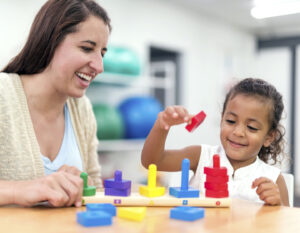

Questions? Concerns? Not sure what to do? Ask expert columnist, Katherine Sellery!
In conjunction with Sassy Mama, Katherine Sellery will take your parenting questions and respond to them online. Please send your parenting problems to [email protected] and she will address them in her next column!
The other day I was in Causeway Bay buying Christmas presents when I witnessed an exasperated father trying to corral his about 3-and-a-half-year-old when he finally resulted to bellowing in the middle of the mall: “1… 2… 3…” and “if you don’t get here before the count of four, young man”. The little guy came running to avoid the pain of whatever that next number falling would met out.
Most of us were raised on threats, a seemingly inexhaustible supply of all-occasion intimidations! They seem to work a lot of the time, but on too many occasions they seem to backfire and too often we tend to run out of them and wonder what else we could use that would be stronger. Our parents must have held out on us!
As parents, we are faced with one struggle after another. How do I get my six-year-old who refuses to go to school out of the house? How do I get my kids to clean up after themselves? To cooperate? To eat the foods that are good for them? Brush their teeth? Do their homework? Go to bed on time? Be nice to their siblings? Be nice to me?


A parent yesterday called certain her child was O.D.D. (Oppositional Defiance Disorder). A large percentage of parents who come to my classes feel the same way. “She just won’t listen or cooperate! She’s driving all of us crazy! What am I going to do? How am I going to get her to cooperate?”
What most parents don’t realise is that there are two general models of kids – there are the “belongers” and there are the “autonomous” kids. What makes each model tick is very different. Since the “belongers” are concerned with how you feel about them and they get their self esteem from belonging and being accepted by others, they are more likely to cooperate then to risk your disapproval. Another way they are referred to is ‘people pleasers’.
Autonomous kids, on the other hand, are prepared to risk your disapproval in order to be self-directed because they feel good about themselves when they are in command of themselves. A controlling form of discipline for this kind of child will wield the most disastrous of results. In fact, it’s guaranteed to trigger what Dr. Thomas Gordon referred to as the 3R’s: retaliation, rebellion and resentment. So when you use demand language and threats like, “do as you are told right now or you’ll spend the rest of the night in time out”, it is certain you won’t get cooperation, or if you do that you will get to pay for it with certain resentment.
According to Dr. Marshall Rosenberg, founder of the Center for Non-Violent Communication, “punishments may seem to work; two questions that reveal the limitations of punishment”:
(1) what do I want this person to do?
(2) what do I want this person’s reasons to be for doing it?
Punishment and reward interfere with someone’s ability to do the things motivated by the reasons we would like them to have. So what are the reasons they have for behaving as we request?
- Avoidance of punishment
- Fear of being rejected by parents
- Fear of upsetting parents
- Fear that a hoped for reward will be withheld – threats
- To avoid shame and guilt
So then what do I do? How do I get my child to cooperate?
The rule of thumb is to actively listen. So we stop demanding and we start listening. Active listening is putting ourselves in the other person’s shoes. Taking their perspective. Seeing things through their eyes and then saying it out loud. If you can put yourself into another person’s shoes and see a situation through their eyes, and then articulate it to such an extent that they feel completely understood, then they will have seen you model for them what it means to be listened to and to have their perspective mirrored back, not just someone restating over and over again what they want, but actually listening to the other’s side. Do that and a child will learn how to listen to you, too.
Here are some examples of what to say to your kids:
- So you’re having a really good time and it’s hard for you to stop right now
- Seems like you’re really enjoy having more free time to do what you want to do and not be directed by other people
- It’s fun to stay up late when you don’t have school the next day and you’re on holiday
- You’re having a hard time stopping and doing what I want you to do
- You really like it when mum and dad are home and you can spend time with both of us just hanging out
- I’m seeing that I’m feeling anxious and I need to be sure that we’re all well rested for the day tomorrow and also that I get the time I need to recuperate, too and I don’t really start to do that until you kids go to sleep
- I’m finding I’m worried about how late it is already and wondering if we can find a way for both of our needs to be met… I’m wondering what you heard me say and if you have any ideas?
 View All
View All











 View All
View All





 View All
View All


 View All
View All











